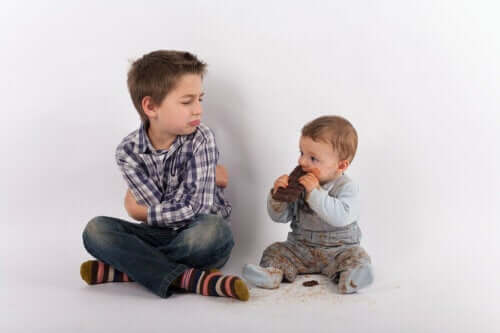Behavioral Changes in Children When a New Sibling Arrives


Written and verified by the psychologist Mara Amor López
When a new sibling arrives, happiness invades your household. However, this also brings about major changes when it comes to your family’s organization and routines. If you already have children, the birth of a baby brother and sister can cause them to display certain behavioral changes. But, it’s important to keep in mind that this is completely normal.
This new addition changes your family’s habits and creates new needs, and requires you all to adjust your schedules. And, of course, this alters the rhythm that your family was used to in the past. Children are the ones who will feel these changes the most, which is why their behavior often changes.
Behavioral changes in children when a new sibling arrives
When a new sibling arrives, this changes the lives of older siblings in a number of ways. This is especially true when it comes to having your second baby. Your oldest will no longer be an only child and will have to learn to share his or her parents’ time, love, and affection with someone else.
These changes can affect the behavior or older siblings and cause them to feel jealous of their new baby brother or sister. And, as a result, the feelings they experience when a new sibling arrives often cause them to display certain behaviorial regressions.
In other words, they may go back to prior stages in their development. However, when this happens, there’s no reason to worry. It’s normal, and your child will gradually adjust – with your help.
What behavioral changes can we observe when a new sibling arrives?

As your older child struggles to adjust to the birth of their sibling, they may suddenly need help with tasks they had already learned to do independently. For example:
- Your child will no longer feed him or herself, but wants to be spoonfed.
- They may want to go back to sleeping in your bed rather than in their own room.
- Your older child may begin wetting the bed, even if they never did before.
These regressions are unconscious. When a new sibling arrives, older children think that by behaving in this way, you’ll give them more attention. After all, it works for the baby!
Children may speak in a more “babyish” fashion
Older siblings may resort to baby talk when the new baby comes home. Again, this is a way of seeking their parents’ attention.
Children may also develop a more irritable nature when a new sibling arrives.
You may notice that your older child gets angry easily and seems more sensitive than usual. What’s more, they may seem to cry for no reason at all. This is all the result of the emotional pressure older siblings experience during these times. Remember, they don’t know how to handle these feelings, so it’s important to be patient.
Sometimes, children may not want one of their parents to tend to them
For example, children may suddenly want one parent to do everything for them while at the same time refusing any help from the other parent.
Bothering the baby
When a new sibling arrives, your older child may also display certain behavior in order to bother the baby. For example, taking away the baby’s pacifier, waking the baby up, or even scold the baby.
All of these behaviors are attention-seeking and there’s no need to worry. This is a natural stage and will gradually fade as older children accept and adjust to the new circumstances. Of course, it’s very important for parents to respond appropriately to prevent behaviors from becoming worse.
What can you do to help older children when a new sibling arrives?

Allow older siblings to be involved from day one – as soon as you find out you’re expecting another baby.
Let your older children help you prepare everything that their little brother or sister will need. For example, picking out and putting away clothing, choosing a new toy, etc. Also, ignore any negative behaviors and reinforce positive behaviors any time you notice them.
Maintain as much of your children’s routines as possible
If your children are used to you reading them a story at bedtime, make a point to keep doing so. If not, your children are likely to blame their baby brother or sister for this change.
Don’t try to idealize the advantages of having a little brother or sister
Avoid saying things like “Now you’ll someone to play with… a new best friend… a confident.” If you do, they’re likely to think all of this will be immediate.
But, the truth is, all of these will take time because the baby will have to grow before he or she can do those things. At first, your newborn won’t be able to join older siblings in their play.
Set aside time to spend exclusively with older siblings
Make a point to find times within your new routine where you can pay special attention to your older child. For example, when your partner is bathing the baby, use the opportunity to play with your oldest. You can take turns with your partner so that your child is able to enjoy quality time with both of you.
Involve older siblings in caring for the newborn
This way, they’ll feel useful and important, which will boost their self-esteem and give them a sense of pride.
Never make comparisons between siblings
Doing so will only increase negative behaviors and attitudes toward the new baby and feed into feelings of jealousy, Remember, every child is unique. All of your children will be different, and that’s okay!
Conclusions regarding behavioral changes in children when a new baby arrives
Now you know what to expect from older siblings when their new baby brother or sister arrives. What’s more, you know how you can help your children adjust to their new situation in a healthy and positive way. Remember to be patient – it’s a stage they need to go through and it’s only temporary.
When a new sibling arrives, happiness invades your household. However, this also brings about major changes when it comes to your family’s organization and routines. If you already have children, the birth of a baby brother and sister can cause them to display certain behavioral changes. But, it’s important to keep in mind that this is completely normal.
This new addition changes your family’s habits and creates new needs, and requires you all to adjust your schedules. And, of course, this alters the rhythm that your family was used to in the past. Children are the ones who will feel these changes the most, which is why their behavior often changes.
Behavioral changes in children when a new sibling arrives
When a new sibling arrives, this changes the lives of older siblings in a number of ways. This is especially true when it comes to having your second baby. Your oldest will no longer be an only child and will have to learn to share his or her parents’ time, love, and affection with someone else.
These changes can affect the behavior or older siblings and cause them to feel jealous of their new baby brother or sister. And, as a result, the feelings they experience when a new sibling arrives often cause them to display certain behaviorial regressions.
In other words, they may go back to prior stages in their development. However, when this happens, there’s no reason to worry. It’s normal, and your child will gradually adjust – with your help.
What behavioral changes can we observe when a new sibling arrives?

As your older child struggles to adjust to the birth of their sibling, they may suddenly need help with tasks they had already learned to do independently. For example:
- Your child will no longer feed him or herself, but wants to be spoonfed.
- They may want to go back to sleeping in your bed rather than in their own room.
- Your older child may begin wetting the bed, even if they never did before.
These regressions are unconscious. When a new sibling arrives, older children think that by behaving in this way, you’ll give them more attention. After all, it works for the baby!
Children may speak in a more “babyish” fashion
Older siblings may resort to baby talk when the new baby comes home. Again, this is a way of seeking their parents’ attention.
Children may also develop a more irritable nature when a new sibling arrives.
You may notice that your older child gets angry easily and seems more sensitive than usual. What’s more, they may seem to cry for no reason at all. This is all the result of the emotional pressure older siblings experience during these times. Remember, they don’t know how to handle these feelings, so it’s important to be patient.
Sometimes, children may not want one of their parents to tend to them
For example, children may suddenly want one parent to do everything for them while at the same time refusing any help from the other parent.
Bothering the baby
When a new sibling arrives, your older child may also display certain behavior in order to bother the baby. For example, taking away the baby’s pacifier, waking the baby up, or even scold the baby.
All of these behaviors are attention-seeking and there’s no need to worry. This is a natural stage and will gradually fade as older children accept and adjust to the new circumstances. Of course, it’s very important for parents to respond appropriately to prevent behaviors from becoming worse.
What can you do to help older children when a new sibling arrives?

Allow older siblings to be involved from day one – as soon as you find out you’re expecting another baby.
Let your older children help you prepare everything that their little brother or sister will need. For example, picking out and putting away clothing, choosing a new toy, etc. Also, ignore any negative behaviors and reinforce positive behaviors any time you notice them.
Maintain as much of your children’s routines as possible
If your children are used to you reading them a story at bedtime, make a point to keep doing so. If not, your children are likely to blame their baby brother or sister for this change.
Don’t try to idealize the advantages of having a little brother or sister
Avoid saying things like “Now you’ll someone to play with… a new best friend… a confident.” If you do, they’re likely to think all of this will be immediate.
But, the truth is, all of these will take time because the baby will have to grow before he or she can do those things. At first, your newborn won’t be able to join older siblings in their play.
Set aside time to spend exclusively with older siblings
Make a point to find times within your new routine where you can pay special attention to your older child. For example, when your partner is bathing the baby, use the opportunity to play with your oldest. You can take turns with your partner so that your child is able to enjoy quality time with both of you.
Involve older siblings in caring for the newborn
This way, they’ll feel useful and important, which will boost their self-esteem and give them a sense of pride.
Never make comparisons between siblings
Doing so will only increase negative behaviors and attitudes toward the new baby and feed into feelings of jealousy, Remember, every child is unique. All of your children will be different, and that’s okay!
Conclusions regarding behavioral changes in children when a new baby arrives
Now you know what to expect from older siblings when their new baby brother or sister arrives. What’s more, you know how you can help your children adjust to their new situation in a healthy and positive way. Remember to be patient – it’s a stage they need to go through and it’s only temporary.
This text is provided for informational purposes only and does not replace consultation with a professional. If in doubt, consult your specialist.








